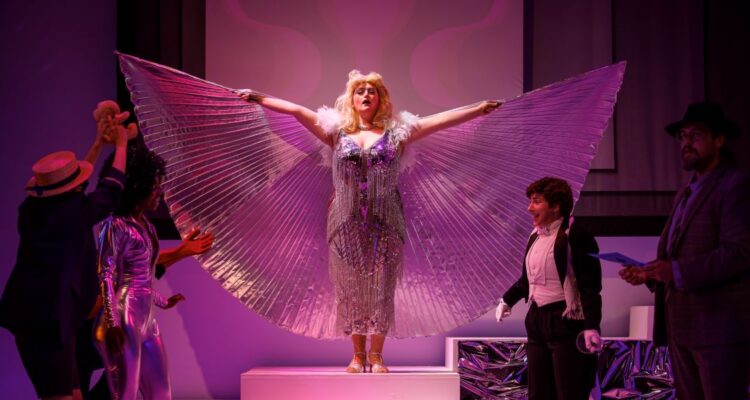Handel’s 1735 opera ‘Alcina’ comes at the end of his career as an opera composer, but within his ‘golden decade’ of the 1730s, when so many of the masterpieces in all genres were composed that now form the gleaming peaks of his reputation. ‘Alcina’ falls within the operatic conventions of the day, but pushes beyond them in the dexterity and complexity of the orchestration, and the sheer variety of moods and vocal colours on display. While the setting is a magical island governed by an enchantress, you also feel that you are being beguiled musically through the evening as one sumptuous, pyschologically complex scene accumulates on top of the last to overwhelming effect.
The plot is not essential to appreciate the experience. Suffice to say that Alcina has bewitched various people on her island whom others then arrive to rescue. In the usual way in Baroque opera, eventually all the wrinkles are unravelled and order is restored while virtue mostly triumphs. The heart of the matter, though, lies in the journey not the arrival, when the outcome is still in doubt. It is at these moments of tension, pressure, anguish and despair that the best of Handel’s music beckons, just as in a modern musical where there is a point when words (or, as here, recitative) are not enough, and only music will suffice. Likewise in the moments of anger, or triumph and joy – music is the inevitable way forward and the occasion of full emotional release.
The Milton Court Theatre at the Guildhall School is an ideal size for Baroque Opera – an intimate space where there is no need to force the sound projection. I wondered at points how long the cast had had to rehearse there, as there were occasions when the voices, especially the male ones, were simply a bit too loud for the space. But this is a small cavil in the face of a generally fine cast. This music is hugely demanding in its technical requirements and acting skills. Precisely articulated coloratura and plausible projection of character are at a premium. There were particularly good examples on display from Georgie Malcolm (in the title role), Yolisa Ngwexana as her sister, Morgana, and Shana Moron-Caravel, in the breeches role of of Ruggiero. There was also some truly delightful idiomatic singing from Samantha Hargreaves as Oberto. Emyr Lloyd Jones made the most of his opportunities as Oronte.
John Ramster’s production was a bit more hit and miss in its choices. Louis Carver’s sets and costumes were the opposite of traditional, with plenty of use of video projection and panels dropping from the flies, to bring to life the phantasmagoric experiences of Alcina’s island. On the whole, though, the costumes provided a more memorable and evocative account of the shifting moods and fantasy aspects of the opera, with Alcina’s opening tableau particularly effective – see photo above – and an extraordinary confection like a Christmas lantern within which Morgana delivered the deliciously effervescent, “Tornami a vagheggiar”.
Principals from the Academy of Ancient Music provided the leads in the orchestra, joined by some students and conducted with point, purpose, and mostly sensible tempi by James Henshaw. There will be fewer harder challenges in their opera years for these students than this work, and for the audience the result was a continuously absorbing and rewarding experience.
Milton Court Theatre, Guildhall School
George Frideric Handel
Director: John Ramster
Conductor: James Henshaw
Cast: Alaric Green, Samantha Hargreaves, Emyr Lloyd Jones, Georgie Malcolm, Shana Moron-Caravel, Yolisa Ngwexana
Until 10 June 2024
3 hours with interval

